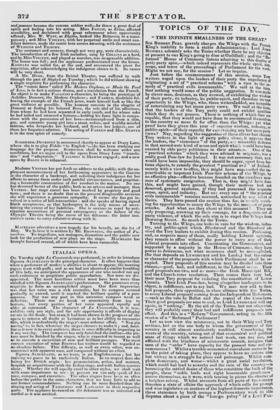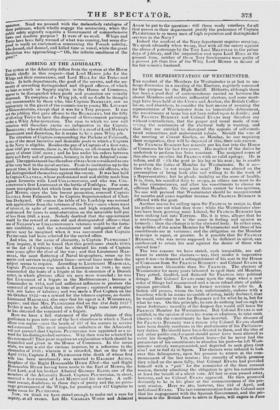TOPICS OF THE DAY.
.'THE INFINITE SMALLNESS OF THE GREAT."
SIR ROBERT PEEL gravely charges the Whigs with the French King's inability to form a stable Administration ; Lord him RUSSELL solemnly asks the Tories whether there be any objection at present to our King's going to dine at Guildhall ; and the "Re. formed" House of Commons listens admiring to this display of petty party spite,—which indeed represents the whole spirit, &its scope, and tenor of the proceedings of Parliament for the week: Might we not say, for the session ? Let us inquire. Just before the commencement of this session, some Tory writers .urged upon the leaders of their party the expediency of originating a set of " practical reforms" with a view to the se. medy of " practical evils innumerable." We said at the time that nothing would come of the politic suggestion. It was made' by clever men, desirous, as they avowed, of exhibiting the wisdom of their party, its industry, its public-spirit, and therefore its vast superiority to the Whigs, who, these writeraadded, are incapable of entertaining any but mean party views. We said at the time that the leaders of the Tory party could not exhibit qualities' which they do not possess. There is nothing of which they are capable, that they would not have done to recommend themselves to the country as more fit for office than the Whigs : yet what proof have they given this year if superior wisdom, industry, or public-spirit—of their capacity for entertaining any but mere party views? Nay, regarding the suggestion of these clever but obscure Tory writers in the light of party policy alone, it appears that the leaders, the " statesmen " of the party, are miserably deficient in that second-rate kind of sense and spirit which would have been exerted by able party politicians in their situation. One of the "practical reforms" which they were advised to originate, was a really good Poor-law for Ireland. It was not necessary that, alit would have been impossible, they should be eager, apart from fac- tious objects, to remedy the greatest "practical evil " of Ireland: merely with a view to office, they might have superseded the im- practicable or impotent Irish Poor-law scheme of the Whigs, by an effective plan—effective because founded on the auxiliary mea• sure of systematic emigration. That is, they might have done this, and might have gained, though their motives had not deserved, general applause, if they had possessed the requisite sense, spirit, and industry. But no: every one of " the practical evils innumerable" remains uncured, untouched by ally effort of theirs. They have passed the session thus far, in merely watch- ing for opportunities to annoy the Whigs by the meanest of party attacks. And what are they about at this moment ? They are only preparing, screwing up their courage, for a des' crate act of party violence, of which the sole aim is to expel the V; higs from Downing Street. So much for the Tories.
Turning to the Whigs, one looks in vain for the wisdom, indus- try, and public-spirit which Blackwood and the Standard ad- vised the Tory leaders to exhibit during this session. Professing, and, as respects many of them, really holding Liberal opinions, they remain in office without the power to carry any of their Liberal proposals into effect. Constituting the Government, and supported by a majority in the House of Commons, they have power to determine, not what measures shall be accolnplished, (for that depends on LYNDHURST and his Lords,) but the colour or character of the proposals with which Parliament shall be oc- cupied. Their proposals of this session may be divided into three classes,—good, bad, and indifferent, in the Liberal sense. Their good proposals are two, and no more—the Irish Municipal Bill, and the Church-rates resolution. Then comes their very bad, their most Tory proposal for violating the constitution of Lower Canada. Their Irish Poor-law, being altogether inadequate to Its object, is indifferent, not to say bad. We may now add to their bad proposals, their opposition, in close alliance with the Tories, to every Liberal proposal coming from the Independent Reformers, —such as the vote by Ballot and the repeal of the Corn-laws. Their good proposals are sure to end, as Lord LYNDHURST will say again, in "nothing." By the aid of the Tories, but not otherwise, they will probably carry their bad and indifferent proposals Into effect. And this is a "Reform" Government, acting in the fifth session of a " Reformed" Parliament I Let us now view the aristocracy, not in their Whig and Tory sections, but as the one body to whom the government of this country is still almost exclusively confided. Considering. the wants of the country, arising out of that economical and political state of things which we noticed last week, can any one, not afflicted with the blindness of aristocratic conceit, imagine that men of the " order " have capacity for the present time and cir- cumstances? Whilst a terrible economical convulsion seems to he on the point of taking place, they appear to have no serious aim but victory in a struggle for place and patronage. Whilst com- plete democracy, and worse—whilst a great social revolution., which could but lead to anarchy and the ruin of the country—is becoming the settled desire of those who constitute the bulk of the.?, people, these "noble lords and right honourable gentlemen amuse themselves, as it were, with tearing in pieces the charter of a helpless colony. Whilst accounts from all parts of the country threaten a state of affairs the approach of which calls. fur prampt and wise legislation on matters of the highest domestic impo.rtan.ce, these statesmen by birth occupy a Parliamentary week in idle disputes about a piece of the "foreign policy" of a Lord PAL" yiERSTON. Need we proceed with the melancholy catalogue of those petilesses, which wholly engage the aristocracy, when the public safety urgently requires a Government of comprehensive views and resolute purpose ? It were of no avail. Whigs and Tories have been fully warned of what was coming, but seem dis- posed to verify an exclamation concerning the French nobility, who dressed, and danced, and killed time as usual, while the great Revolution was approaching—" Oh, the infinite smallness of the
great!"



























 Previous page
Previous page